八年级第一节英语课
- 格式:doc
- 大小:42.61 KB
- 文档页数:3
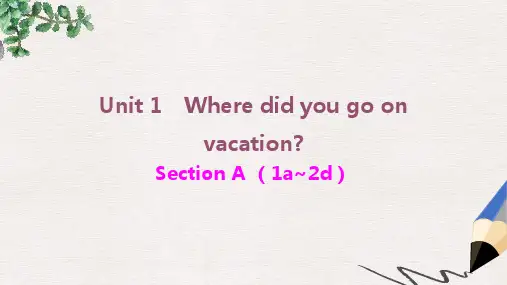
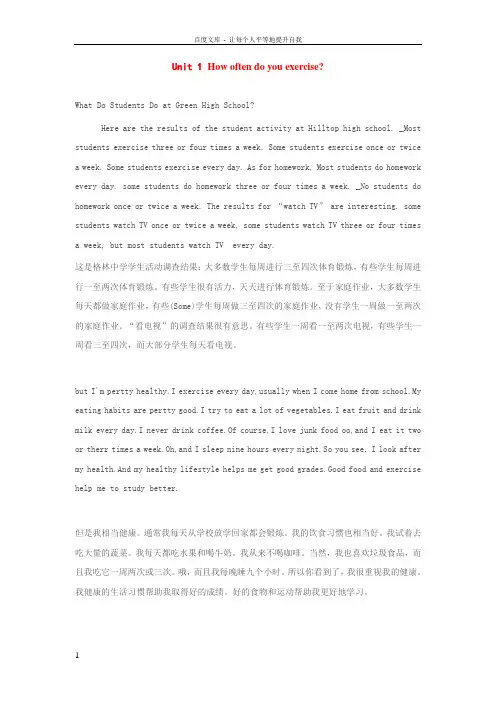
Unit 1 How often do you exercise?What Do Students Do at Green High School?Here are the results of the student activity at Hilltop high school. _Most students exercise three or four times a week. Some students exercise once or twice a week. Some students exercise every day. As for homework, Most students do homework every day. some students do homework three or four times a week. _No students do homework once or twice a week. The results for “watch TV” are interesting. some students watch TV once or twice a week, some students watch TV three or four times a week, but most students watch TV every day.这是格林中学学生活动调查结果:大多数学生每周进行三至四次体育锻炼,有些学生每周进行一至两次体育锻炼。
有些学生很有活力,天天进行体育锻炼。
至于家庭作业,大多数学生每天都做家庭作业,有些(Some)学生每周做三至四次的家庭作业,没有学生一周做一至两次的家庭作业。
“看电视”的调查结果很有意思。
有些学生一周看一至两次电视,有些学生一周看三至四次,而大部分学生每天看电视。
but I'm pertty healthy.I exercise every day,usually when I come home from school.My eating habits are pertty good.I try to eat a lot of vegetables.I eat fruit and drink milk every day.I never drink coffee.Of course,I love junk food oo,and I eat it two or therr times a week.Oh,and I sleep nine hours every night.So you see, I look after my health.And my healthy lifestyle helps me get good grades.Good food and exercise help me to study better.但是我相当健康。
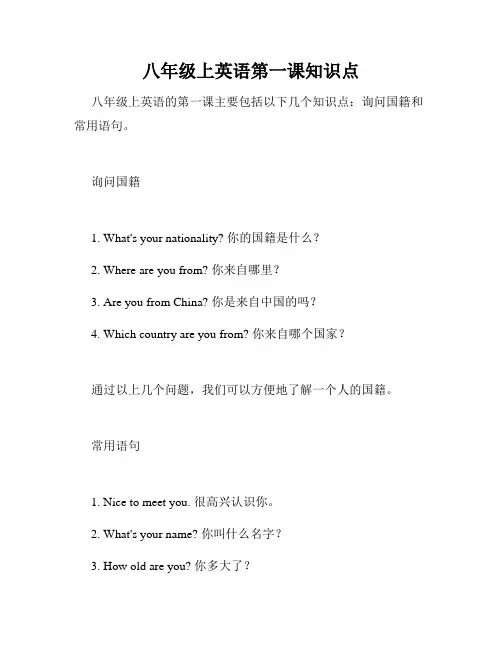
八年级上英语第一课知识点八年级上英语的第一课主要包括以下几个知识点:询问国籍和常用语句。
询问国籍
1. What's your nationality? 你的国籍是什么?
2. Where are you from? 你来自哪里?
3. Are you from China? 你是来自中国的吗?
4. Which country are you from? 你来自哪个国家?
通过以上几个问题,我们可以方便地了解一个人的国籍。
常用语句
1. Nice to meet you. 很高兴认识你。
2. What's your name? 你叫什么名字?
3. How old are you? 你多大了?
4. Do you speak English? 你会说英语吗?
5. I'm sorry. 对不起。
6. Excuse me. 对不起,打扰了。
以上几个常用语句在日常交往中经常使用,掌握了这些语句可
以让我们更加方便地与人交流。
总结
通过本节课的学习,我们学习到了如何询问他人的国籍以及常
用语句。
这些知识点对于我们的英语学习和日常生活都非常有用,希望大家在以后的学习中能够不断地加深自己对这些知识点的理
解与掌握,从而更加顺利地进行交流。
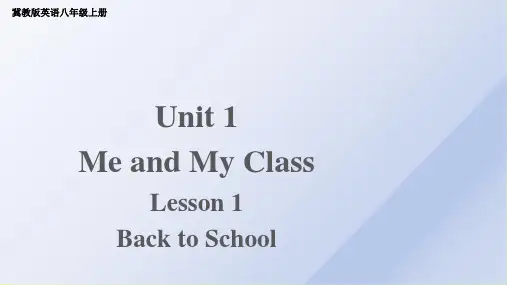

八年级l上册英语第一课知识点八年级上册英语第一课知识点八年级上册英语第一课的名字叫做 Welcome back to school,是一节介绍如何欢迎新学期的课程。
下面我们来总结一下这节课的知识点。
1. 问好和介绍自己遇见新同学和老师,需要问好并介绍自己。
可以用像“Hello, my name is…”或者“Nice to meet you.”这样的句型。
2. 谈论课程表在新学期,课程表通常有所变化,需要谈论课程表,并列出上课时间和地点。
可以用像“What classes do you have today?”或者“Do you have English in the afternoon?”这样的问句。
3. 谈论活动学校通常会在新学期组织各种各样的活动,需要谈论这些活动,并决定哪些活动值得参加,或者自己想参加的活动。
可以用像“Have you heard about the school dance?”或者“I want to do some volunteering this semester.”这样的句型。
4. 谈论成绩新学期开始,老师通常会公布上学期的成绩,需要谈论自己的成绩并决定如何提高自己的成绩。
可以用像“Have you seen your grade yet?”或者“Do you have any tips on studying for tests?”这样的问句。
5. 谈论目标新学期开始,有时候会设立一些学习目标,需要谈论自己的目标,并确定如何完成这些目标。
可以用像“My goal is to improvemy English speaking skills.”或者“Do you have any suggestions for achie ving my goal?”这样的句型。
以上就是八年级上册英语第一课的知识点。
希望大家在新的学期里能够取得更好的成绩!。
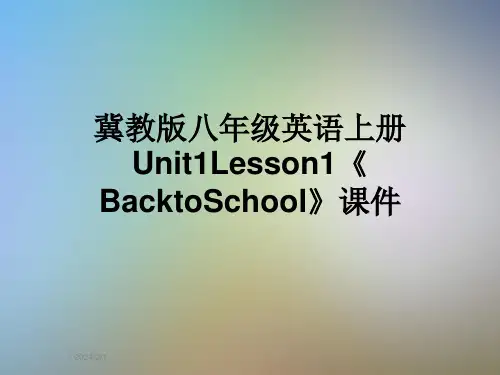
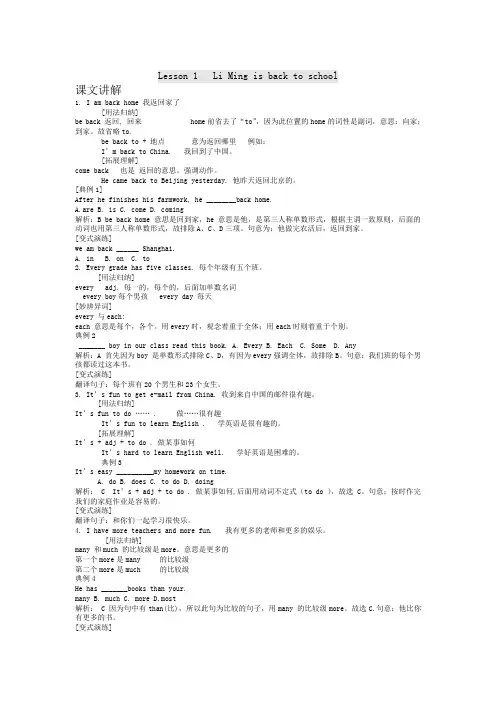
Lesson 1 Li Ming is back to school课文讲解1. I am back home 我返回家了[用法归纳]be back 返回, 回来 home前省去了“to”,因为此位置的home的词性是副词,意思:向家;到家。
故省略to.be back to + 地点意为返回哪里例如:I’m back to China. 我回到了中国。
[拓展理解]come back 也是返回的意思。
强调动作。
He came back to Beijing yesterday. 他昨天返回北京的。
[典例1]After he finishes his farmwork, he ________back home.A.areB. isC. comeD. coming解析:B be back home 意思是回到家,he 意思是他,是第三人称单数形式,根据主谓一致原则,后面的动词也用第三人称单数形式,故排除A、C、D三项。
句意为:他做完农活后,返回到家。
[变式演练]we am back ______ Shanghai.A. inB. onC. to2. Every grade has five classes. 每个年级有五个班。
[用法归纳]every adj. 每一的,每个的,后面加单数名词every boy每个男孩 every day 每天[妙辨异词]every 与each:each 意思是每个,各个。
用every时,观念着重于全体;用each时则着重于个别。
典例2_______ boy in our class read this book. A. Every B. Each C. Some D. Any解析:A 首先因为boy 是单数形式排除C、D,有因为every强调全体,故排除B。
句意:我们班的每个男孩都读过这本书。
[变式演练]翻译句子:每个班有20个男生和23个女生。
3. It’s fun to get e-mail from China. 收到来自中国的邮件很有趣。
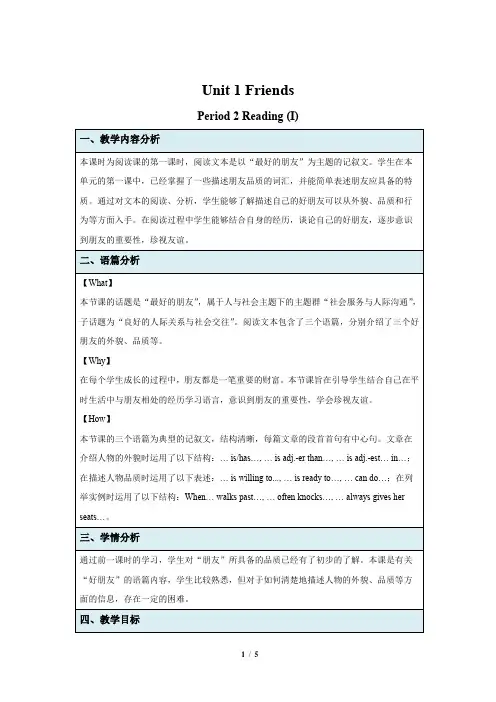
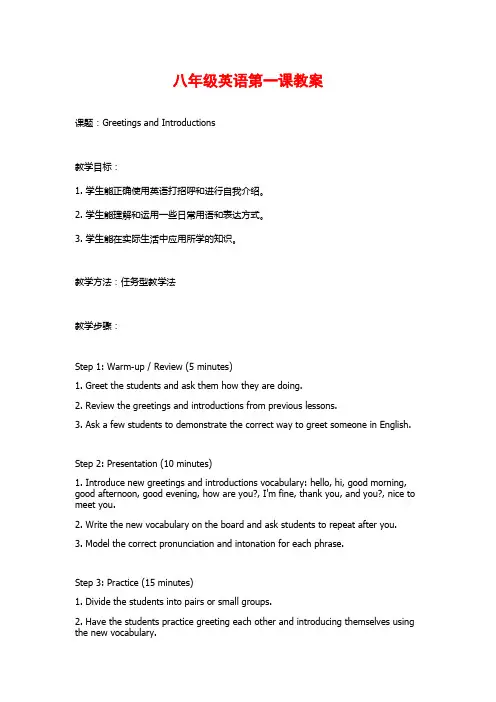
八年级英语第一课教案课题:Greetings and Introductions教学目标:1. 学生能正确使用英语打招呼和进行自我介绍。
2. 学生能理解和运用一些日常用语和表达方式。
3. 学生能在实际生活中应用所学的知识。
教学方法:任务型教学法教学步骤:Step 1: Warm-up / Review (5 minutes)1. Greet the students and ask them how they are doing.2. Review the greetings and introductions from previous lessons.3. Ask a few students to demonstrate the correct way to greet someone in English.Step 2: Presentation (10 minutes)1. Introduce new greetings and introductions vocabulary: hello, hi, good morning, good afternoon, good evening, how are you?, I'm fine, thank you, and you?, nice to meet you.2. Write the new vocabulary on the board and ask students to repeat after you.3. Model the correct pronunciation and intonation for each phrase.Step 3: Practice (15 minutes)1. Divide the students into pairs or small groups.2. Have the students practice greeting each other and introducing themselves using the new vocabulary.3. Circulate around the classroom and provide assistance as needed.4. Call on a few pairs or groups to demonstrate their conversations to the class.Step 4: Consolidation (10 minutes)1. Have students form a circle.2. Toss a ball or a stuffed animal to a student and ask them to say a greeting or introduction phrase.3. The student then tosses the object to another student and the process repeats.4. Encourage students to use different greetings and introductions each time.Step 5: Extension Activity (10 minutes)1. Ask students to create their own dialogue using the greetings and introductions they have learned.2. Have students perform their dialogues in front of the class.3. Provide feedback and praise for their efforts.Step 6: Homework (5 minutes)1. Assign students the task of practicing greetings and introductions with a family member or friend outside of class.2. Encourage students to report back on their experiences in the next lesson.教学资源:1. PPT或黑板。
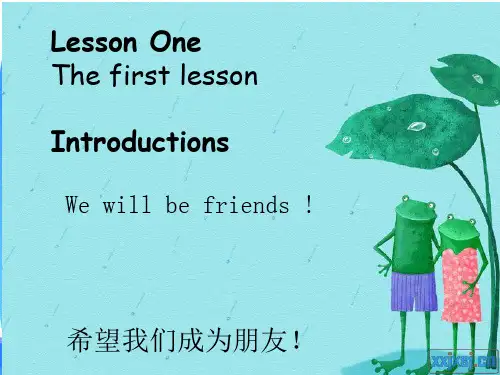

初中八年级英语第一课教案Objectives:1. To learn how to greet people and introduce oneself in English.2. To practice the use of present tense in describing one's age, nationality, and hobbies.3. To develop listening, speaking, reading, and writing skills.Materials:1. Textbook: English 8A2. Teacher's Manual3. Worksheets4. Flashcards5. Audio recording of the dialogueProcedure:1. Warm-up (5 minutes)a. Teacher asks students to write down three sentences about themselves (name, age, hobby).b. Students read their sentences to the class and introduce themselves.2. Introduction (10 minutes)a. Teacher introduces the new lesson topic: Greetings and Introductions.b. Teacher shows flashcards of different people and asks students to guess their names, ages, and nationalities.c. Students practice introducing themselves using the present tense (e.g., I am 14 years old, I am from China, I like playing soccer).3. Listening (15 minutes)a. Teacher plays the audio recording of the dialogue and asks students to listen carefully.b. Students answer the following questions:1. Who are the two speakers?2. Where are they from?3. How old are they?4. What are their hobbies?4. Speaking (10 minutes)a. Students role-play the dialogue in pairs, using the present tense to introduce themselves.b. Teacher asks volunteers to perform their role-plays in front of the class.5. Reading (10 minutes)a. Teacher hands out the worksheets and asks students to read the passage about greetings and introductions.b. Students complete the exercises on the worksheet, including fill-in-the-blanks, true/false, and matching.6. Writing (10 minutes)a. Teacher asks students to write a short paragraph about themselves, including their name, age, nationality, and hobbies.b. Students share their paragraphs with the class and read them aloud.7. Summary (5 minutes)a. Teacher reviews the main points of the lesson, including how to greet people and introduce oneself in English.b. Students ask any questions they have.8. Homework (5 minutes)a. Teacher hands out the homework assignment, which includes practicing the dialogue, completing additional exercises, and preparing for the next lesson.b. Students take the assignment home and complete it for homework.Note: This lesson plan can be adjusted according to the level and needs of the students.。
八年级英语上册第一课笔记一、重点单词。
1. anyone.- 词性:代词,意为“任何人”,用于否定句和疑问句中。
例如:Did you meet anyone interesting at the party?(你在聚会上遇到有趣的人了吗?)- 同义词:anybody。
2. anywhere?- 词性:副词,意为“在任何地方;无论何处”,常用于否定句和疑问句。
例如:I can't find my keys anywhere.(我到处都找不到我的钥匙。
)3. wonderful.- 词性:形容词,意为“精彩的;绝妙的”。
例如:We had a wonderful time at the concert.(我们在音乐会上度过了一段美妙的时光。
)- 同义词:excellent, great。
4. few.- 词性:形容词,意为“不多;很少”,修饰可数名词复数,表示否定意义。
例如:There are few apples on the tree.(树上没几个苹果了。
)- 反义词:many。
- 区别:a few表示“一些;几个”,表示肯定意义。
例如:There are a few books on the desk.(桌子上有几本书。
)5. most.- 词性:形容词,意为“大多数;大部分”,既可以修饰可数名词复数,也可以修饰不可数名词。
例如:Most students like English.(大多数学生喜欢英语。
)Most water is clean.(大部分水是干净的。
)- 还可作代词,例如:Most of us are from China.(我们大多数人来自中国。
)6. something.- 词性:代词,意为“某事;某物”,常用于肯定句中,在否定句和疑问句中要变为anything。
例如:I have something to tell you.(我有事情要告诉你。
)Do you have anything to say?(你有什么要说的吗?)7. nothing.- 词性:代词,意为“没有什么;没有一件东西”。
博文教育八年级英语学案
1.完成表格:英语动词根据动作与时间的关系,在句子中有五种基本形式,即原形,
第三人称单数,过去式和现在分词。
以下列词为例:
2.各种时态是怎样构成的?
A 表(以be 动词为例)
B 表(以work 为例)
1).第三人称单数
2).现在分词
3)过去式
时态练习新课标第一网
一、写出下列动词的第三人称单数形式、过去式和现在分词
go _________ ___________ ________ enjoy _______ _______ ________
buy _________ _________ _________ eat_________ __________ __________ get _________ _________ _________ walk __________ _________ ________ take_________ _________ _________ dance__________ __________ _______ write __________ ________ ________ run_________ _________ _________ swim__________ _________ _________ find _________ _________ _________ begin_________ _________ _________ eat _________ __________ _________ play __________ __________ __________ study _________ _________ ________
三、用动词的适当形式填空。
新课标第一网
1、Tom ______ (swim) in the river now.
2、Daniel and Tommy________ (be) in Class One.
3、She usually ______ (do) her homework in the evening.
4、It’s eight o’clock now. The boys ______ (watch) TV.
5、What does your father ______ (do)? He’s a worker.
7. Look! Jim and Tom ______ (run) there.
8. He often __________(have) dinner at home.
9. We _________(not watch) TV on Mondays.
13. ______your parents________ (read) newspapers every day?
15. She ________(not do) homework every day.
16. There ______(be) an English test next Monday.
17. Mike __________(cook) in the kitchen now.
18. She_______ (visit) the Great Wall this summer holiday.
19. Liu Tao _______(do not) like PE.
20. Don’t talk. The baby ________(sleep).
21. Mary _______ (read) English yesterday morning.
22. There _________ (be) no one here a moment ago.
23. Tom _______ (begin) to learn Chinese last year.
24. My mother _______ (not do) housework yesterday.
25. She watches TV every evening. But she ______ (not watch) TV last night.
四、改错。
划出错误点,并在括号内改正。
( )1. Is your brother speak English now?
( )2. Does he likes going fishing?
( )3. He likes play games after class.
( )4. Mr. Wu teachs us English.
( )5. She don’t do her homework on Sundays.
( )6. She is going to going swimming next Sunday.
( )7. There is going to have a football match tomorrow.
( )8.How is Jane yesterday?
( )9.He go to school by bus last week.
( )10.Did you saw him just now.
( )11.Tom wasn’t watch TV last night.。